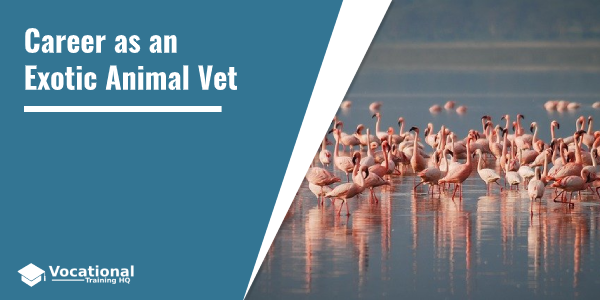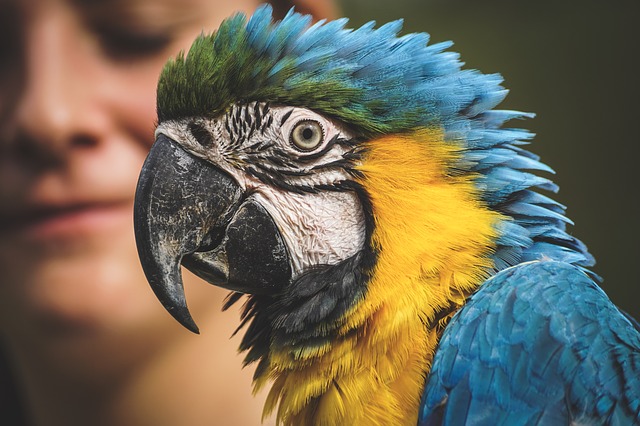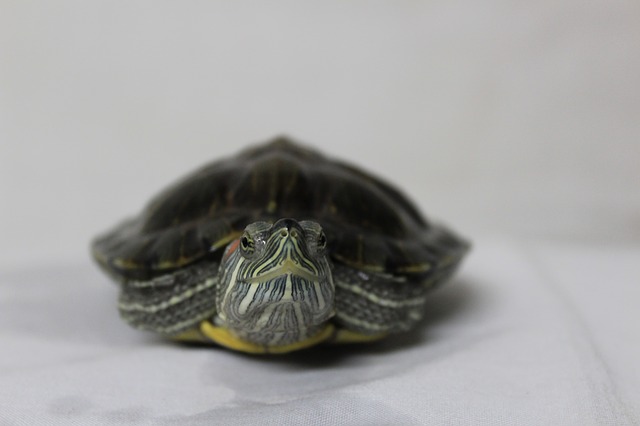Exotic animal vets are quite common.
More veterinarians provide care to domestic animals.
However, the interest in exotic animals has been growing, and the demand for exotic animal vets has increased as well.
Exotic animals aren’t limited to ferrets, rabbits, hamsters, and snakes anymore.
More people are adopting exotic birds and other species that aren’t traditional pets.
With the growing popularity of exotic animals, exotic animal vets treat a wide range of exotic mammals, reptiles, and amphibians.
What’s more, these species are no longer limited to zoo or wildlife settings.
People keep exotic animals at home.
Therefore, more exotic animal hospitals appeared across the country.
So, exotic vets aren’t practicing only in zoo or wildlife settings either.
Exotic animal vets are generally responsible for issuing vaccinations, providing emergency care when necessary, and performing surgery.
With the growing popularity of exotic animals, advanced techniques also appeared that help diagnose and treat various types of ailments.
It includes treating ferrets with adrenal gland disease, remedying rabbits with dental disease, treating lizards with bladder stones, or fixing fractures in birds.
Treating many species of animals is one of the most exciting parts of being an exotic animal vet.
Caring for rodents, such as guinea pigs or hamsters, requires a different approach than treating reptiles, such as lizards or turtles.
Since exotic animals can be quite unpredictable, sedation is essential.
For this reason, many exotic animal vets are properly trained in the precautionary measures required when administering medical treatment.
Article Table of Contents
Where do Exotic Animal Vets Work?
As mentioned earlier, exotic animal hospitals are becoming more common across the US.
While these hospitals provide care for exotic birds and animals, a veterinarian has the final say in what kind of animals will or won’t be treated.
For instance, primates or venomous reptiles could be turned away.
Exotic animal vets can also find multiple opportunities in wildlife settings.
It doesn’t mean they have to go out in the wild.
The services of exotic animal vets are required in wildlife rescue facilities to treat ailing and wounded wild animals.
Another popular workplace for exotic animal vets includes the zoos.
In this environment, vets care for all kinds of animals far beyond the score of what they would face in an exotic animal hospital.
Wildlife conservation and aquariums are other places where an exotic animal vet can build a career.
Education Requirements to Become an Exotic Animal Vet
The first step to becoming an exotic animal vet is obtaining a Bachelor’s Degree that includes a strong background in the sciences.
After that, graduates should attend vet college.
However, the competition for admission is extremely high.
In the process, applicants can be asked to provide proof of work experience in a veterinary setting.
Vet colleges usually seek applicants with a good amount of experience working with animals.
Those who wish to specialize in exotic animal treatment should try to find work in a setting working with exotic animals to gain relevant experience.
Once an applicant is admitted to a vet college, they will have to complete a four-year program.
Some vet colleges have exotic vet programs.
Through them, students can get more detailed training in treating exotic animals.
Since there are not so many exotic animal vets, those who are pursuing a career in this field should apply to a specific vet college.
Some colleges have teaching hospitals that contribute to education.
Vet college programs are designed to cover classroom and lab work during the first three years, and the fourth year includes doing the clinical rotation.
In the final year, students can work in a real vet setting with exotic animals.
After completing the program, students are awarded the title of Doctor of Veterinary Medicine (D.V.M.).
With it, graduates can look for employment, however, they may be required to complete an internship to gain more experience before they become a full-time exotic animal vet.
To enhance their skills as an exotic animal vet, recent graduates can also access residencies.
Salary/Job Outlook
Since the profession is unique, exotic animal vets have a wide spectrum of salaries ranging from $60,000 to $100,000 per year.
Keep in mind that the salary can increase over time with more experience.
The salary can also vary depending on the workplace.
For instance, exotic animal hospitals may have clients that are willing to pay a higher amount for the treatment of their exotic pets.
Wildlife conservation, on the other hand, may not receive the same sort of funding, so the salary of exotic animal vets there is lower.
The job prospects for exotic animal vets are positive since these vets are the smallest part of practicing vets.
The demand for these professionals has increased as people are getting more exotic pets.
While there are not so many jobs for exotic animal vets, there are also fewer candidates for the positions.
Considering this, an exotic animal vet can find employment easier than small animal vets.
Licensing/Certification
The licensing process for these vets is the same as for other vets.
Before obtaining a license, they have to meet the requirements set by the Veterinary Boards in every state.
Future vets have to pass a statewide exam.
Some states have additional requirements to be met.
In the field of exotic animal veterinary, board certification is new.
To have an opportunity to become a diplomate under the new Exotic Companion Mammal Practice category, vets need at least six years of experience in a high-quality practice.
It was established by the ABPN (American Board of Practicing Veterinarians) not so long ago.
So far, there are only a couple dozen diplomates since this distinction requires a lot of experience, time, and commitment.
This is the only way how exotic animal vets can become board certified.



